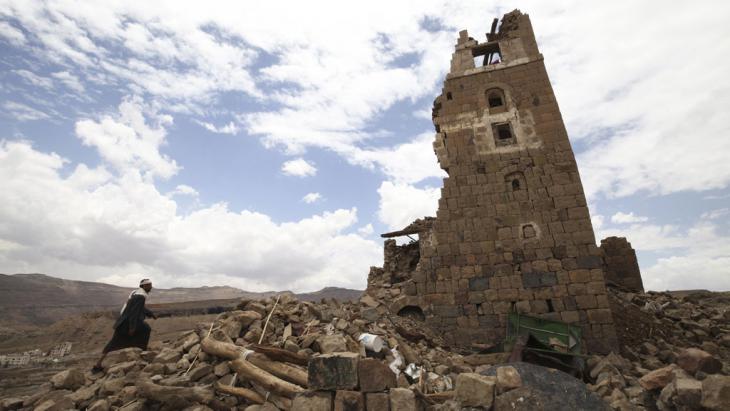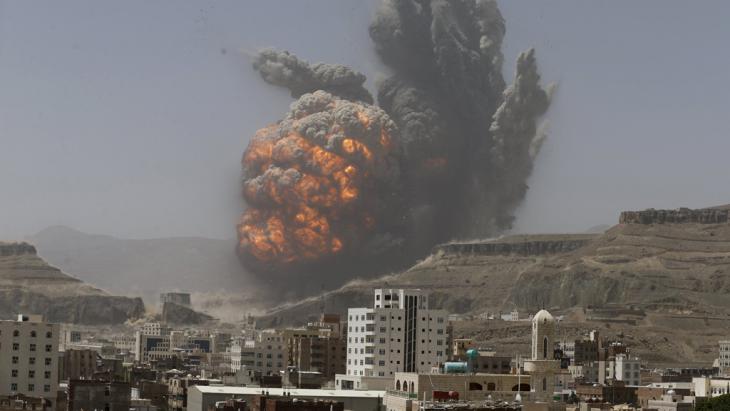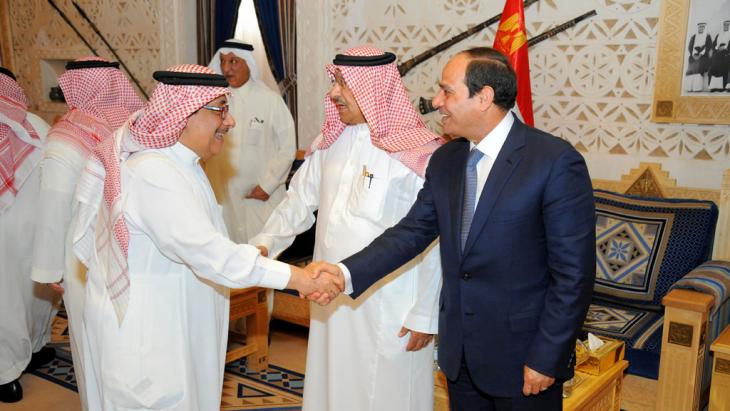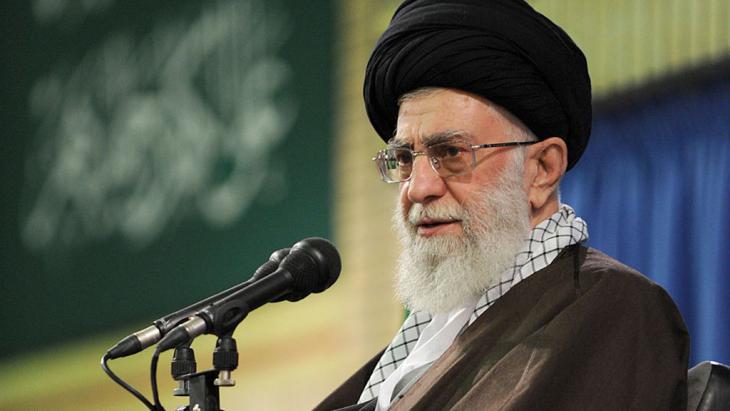The threat of a regional conflagration

His opponents can be happy about one thing at least: he is evidently much younger than he himself believes. For the Iranian media, the new Saudi defence minister, Mohammad Salman, is only 30 years old and not 34, as stated on his official website. The news agency Fars, which has close links to the Revolutionary Guards Corps, even claims that the Saudi prince is the youngest defence minister of all time. If the story concerns Mohammad Salman and the Saudi war in Yemen, the adjective "young" would appear to be obligatory for Iranian media.
The most powerful man in Iran, Ali Khamenei, recently issued an uncharacteristically harsh criticism of Saudi Arabia, describing the aerial bombardment of Yemen as genocide and equating the conflict with the Israeli war in Gaza. Iran, he admitted, has always had its issues with Saudi Arabia, but up to now, the Saudis had maintained past form. But ever since the "inexperienced boys in Riyadh have been at the helm", the barbarism has been revealed in its entirety, Khamenei told an audience of selected guests. Strangely, of all these verbal attacks, only the attribute "the boys" is being repeated like a refrain in the media.
For example, the website "Iran Diplomacy", a key foreign policy mouthpiece for moderate Iranian President Hassan Rouhani, writes that the young prince may be trying to demonstrate energy, freshness and drive, but he is in actual fact behaving like an inexperienced and ill-mannered upstart.
Regardless of Mohammad Salman's actual age, the prince is currently leading an unorthodox military coalition of 10 Sunni states, from large and powerful ones such as Pakistan and Egypt through to smaller failed states such as Bahrain and Sudan.
In his weekly media briefing, the coalition's spokesman, Saudi General Ahmad Assiri, said fighter jets were carrying out an average 30 air attacks on neighbouring Yemen every day. His pilots were sparing civilians and primarily targeting the army bases and arsenals of Yemen's ex-President Ali Abdullah Saleh, claimed the general, who also repeatedly dictated the nebulous and unrealistic objectives of the campaign: the Houthi fighters must lay down their weapons, withdraw from the capital Sanaa and finally accept the fugitive ex-President Abd Rabbu Mansour Hadi as head of state.

Has the prince miscalculated?
But even the general himself cannot possibly believe that these objectives can be reached with airstrikes. He must be aware that ground troops are needed to properly tackle the well-armed Houthi rebels, who have experience of guerrilla combat and who operate across the entire country. He needs an experienced, resolute and confident special force committed to a long, hard war, but troops of this calibre are not currently available.
Pakistan and Egypt, who were initially under discussion, have in the meantime categorically rejected the idea of deploying ground troops. So the bombardments continue for the time being, without any indication that the rebel advance has been impeded to any great extent. But at the same time, the nightly attacks are destroying the infrastructure of the very same security apparatus that was thus far utilised to fight al-Qaida.
In other words, there's chaos wherever you look. After about three weeks of airstrikes and the dropping of around one thousand bombs, the young prince's inexperience was quickly becoming evident. This is a minister who has neither had a military education nor done military service, but who is instead a graduate of Islamic law.
His powerbase is nevertheless secure; as a minister and leader of his gravely-ill father's cabinet, he speaks as the de facto King. In addition, not only is he the Supreme Commander of the Armed Forces, he is also Finance Minister. This is because he heads a commission that monitors oil revenue and expenditure. His opponents may accuse him of being corrupt, greedy and arrogant, but he himself is confident that he is on a path to greater things: Salman is seen as a likely heir to the throne.
But the prince appears to have miscalculated not only militarily, but also politically. Both the Sunni and the Western worlds are meant to believe that his campaign in Yemen is in truth a war against the power-hungry mullahs in Tehran who, after Iraq, Syria and Lebanon now unashamedly want to take control of Yemen. But Tehran is conspicuously holding back and persistently calling for peace. Besides, no concrete military evidence has so far emerged of any Iranian involvement in Yemen, although there are plenty of other mutual provocations occurring on the sidelines of this conflict.

Sexual attacks and the propaganda war dilemma
The latest and most unsavoury incident among these is the sexual harassment of two 14 and 15-year-old Iranian pilgrims by Saudi border guards at Jeddah airport. It is unclear what the police officers did with the two teenagers, whom they separated at the departures gate and led into a room. But once the teenagers had arrived back in Tehran, family members and parliamentary deputies claimed they had been raped and demanded a robust response. The newspapers and media agencies then cautiously took up the story.
But then, a number of websites and social networks quickly jumped in, publishing insults and gutter humour within just a few hours. These were shared several million times. Saudi Arabia was both the target and the cause. Before long, the wave of digital indignation went beyond Saudi Arabia; suddenly anything Arab became the target of caustic, mocking and sometimes racist comments.
Three days later, a demonstration was held in front of the Saudi embassy in Tehran. In terms of both its outward appearance and content, this demonstration was different from all the usual state-organised rallies held to date. Well-dressed residents of northern Tehran stood outside the Saudi representation and shouted slogans that were not at all Islamic in nature, but nationalistic: "Why make the pilgrimage to Mecca?!", their placards read.
Iran's official propaganda machine suddenly faced a dilemma: angry voices against Saudi Arabia may be welcome, but they should not mutate into manifestations of Persian nostalgia or become an expression of anti-Arab or even anti-Islamic feeling. The government in Tehran stuck to its official version of events: it was not rape, but sexual harassment; Saudi Arabia must nevertheless apologise and arrest the police officers responsible.

Pilgrimages to Mecca suspended
Despite such attempts to bring some moderation to the situation, the atmosphere remains tense, and the Iranian government is under pressure to act. Ali Jannati, Minister of Culture and Islamic Guidance, announced on state television that until the two Saudi officials have been arrested and punished, there will be no more pilgrimages to Mecca outside of the official hajj season.
While Saudi Arabia is officially ignoring the incident and saying nothing about it, the propaganda mill in Tehran continues to turn. "The rape and humiliation of pilgrims is systematic," declared Iran's judicial authority, which is controlled by hardliners. This means the statement is a kind of legal-religious opinion — and that has far-reaching consequences because it is questioning Saudi Arabia's credentials as guardian of Islam's holiest shrines for all Muslims.
But there is no mention of all this Iranian agitation and outrage in the Saudi media. Saudi–Iranian relations have clearly reached a low point similar to the one 29 years ago, when the founder of the Iranian Republic Ayatollah Ruhollah Khomeini declared: "I will probably forgive Saddam Hussein one day, but never Al-Saud."
But such comparisons are always problematic. Iraq, the enemy at that time, has long advanced to the status of ally, and it is Saudi Arabia that is now involved a war without attainable goals.
Dangerous rivalry, uncertain future
The flames of the military and propaganda fires are blazing, and they have huge potential to grow and spread. They could develop into a huge conflagration, a blaze that transgresses borders and affects several countries. Or they will become an unending smouldering fire with an uncertain outcome. Whatever happens, the flames will not die down that quickly.
Where the military adventure in Yemen will eventually lead also depends on the words and deeds of the leaders in Tehran. Senior figures within the Islamic Republic are still trying to keep a cool head, after all, Iran is neither willing nor able to enter into a military adventure – particularly in view of the fact that it is currently entering the world of diplomacy through its nuclear negotiations.
While Foreign Minister Javad Zarif recently presented a four-point peace plan for Yemen in the Spanish capital Madrid – which Saudi Arabia naturally rejected out of hand – the West has strangely thrown its entire weight behind Saudi Arabia. The UN Security Council imposed a weapons embargo on the Houthi rebels and called on them to withdraw from occupied territories. Hours later, the Houthi-controlled Yemeni news agency said the resolution directly supported the enemy and that this act of hostility would be punished by the people.
Ali Sadrzadeh
© Iran Journal/Qantara.de 2015
Translated from the German by Nina Coon
